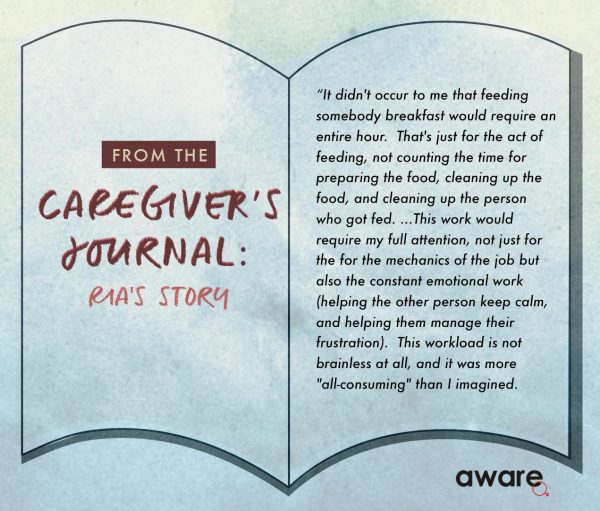-
Advocacy Theme
-
Tags
- Abortion
- Adoption
- Caregiving
- CEDAW
- Disability
- Domestic Violence
- Domestic Workers
- Harassment
- Healthcare
- Housing
- International/Regional Work
- Maintenance
- Media
- Migrant Spouses
- Migrant Workers
- Muslim Law
- National budget
- Parental Leave
- Parenthood
- Polygamy
- Population
- Race and religion
- Sexual Violence
- Sexuality Education
- Single Parents
- Social Support
- Sterilisation
- Women's Charter
From the caregiver’s journal: Ria’s story
April 20th, 2018 | Older People and Caregiving, Your Stories

Our “Your Stories” series are submissions shared with us via email or in one-on-one interviews, for the purposes of our research and campaigns. All names have been changed (unless the use of real names was explicitly permitted by the author), and we have sought permission to publish from the authors/interviewees themselves. The opinions expressed in these posts do not represent those of AWARE.
Ria: Here are 3 big challenges that surprised me about being a caregiver.
1. The first big surprise challenge was simply the amount of work – the size of the workload. The sheer number of hours was enormous, day after day without break, for years. I had been told it’s a lot of work but I didn’t grasp why the work was so time-consuming, and I didn’t grasp how simple tasks could take so long. For example, it didn’t occur to me that feeding somebody breakfast would require an entire hour. That’s just for the act of feeding, not counting the time for preparing the food, cleaning up the food, and cleaning up the person who got fed. I also didn’t appreciate that this work would require my full attention, not just for the for the mechanics of the job (e.g. feeding) but also the constant emotional work (helping the other person keep calm, and helping them manage their frustration). This workload is not brainless at all, and it was more “all-consuming” than I imagined.
2. The second big surprise challenge was how the family treated me. While I was getting a crash course in learning how hard it was, other people didn’t get it. Even the family members I lived with, who were under the same roof and saw the care daily, always under-estimated my workload by sometimes tenfold. For example, if they personally saw me do 1 hour per day of work, then they believed my entire workload was roughly 2 hours per day. They never thought rationally about how the rest of the work got done. They had magical thinking. My husband was in denial about everything – the caregiving, the infirmity, the difficulties, the workload – everything. Part of his denial was to avoid uncomfortable emotions, and to avoid accepting that a loved one needed extensive care. Part of his denial was to avoid feeling guilty that he was totally neglecting his share of this caregiving obligation. This was his blood-relative. Part of his denial was to minimise my contributions, and to pretend that my day was filled with freedom and fun activities, so he wouldn’t feel bad.
3. The third surprise challenge of being a caregiver is that unequal roles persisted in the family for many years after the caregiving ended.
- After inequality begins, it becomes a self-perpetuating cycle.
- There’s a lasting change in family roles. I’m the most trusted and the least thanked person in the family.
- The people who avoided caregiving have entered a cycle of escapism, which feeds on itself.
One more thing: Here is a story about how my caregiving burdens went from bad to worse. There were some bad months when the caregiving role became dangerously overwhelming for me – it was round-the-clock, never allowing me to sleep, causing me serious health problems. I asked lots of people for help. I told friends and neighbours and extended family that I couldn’t take it. My husband was suddenly more ashamed of the situation, after I told other people about it. When he felt that shame, he resolved to help me, and he pushed away everybody’s offers of support, telling them it was under control. But underneath his assurances, he was still scared of caregiving, still scared of human frailty, still unwilling to learn the real work of caregiving. It was a lie, when he said that everything was under control. It was a lie, when he said that people were already helping me. It was a lie, when he said that he was doing 50% of the work. It was a lie that he needed to tell himself to get through the crisis. But his need worsened the caregiving burdens on me.
Many families have at least one person who doesn’t want outsiders to know the truth, that the caregiver needs help. Sometimes it’s the caregiver whose pride would be wounded, but it doesn’t matter whose pride it is. The effect on the caregiver is still the same.



